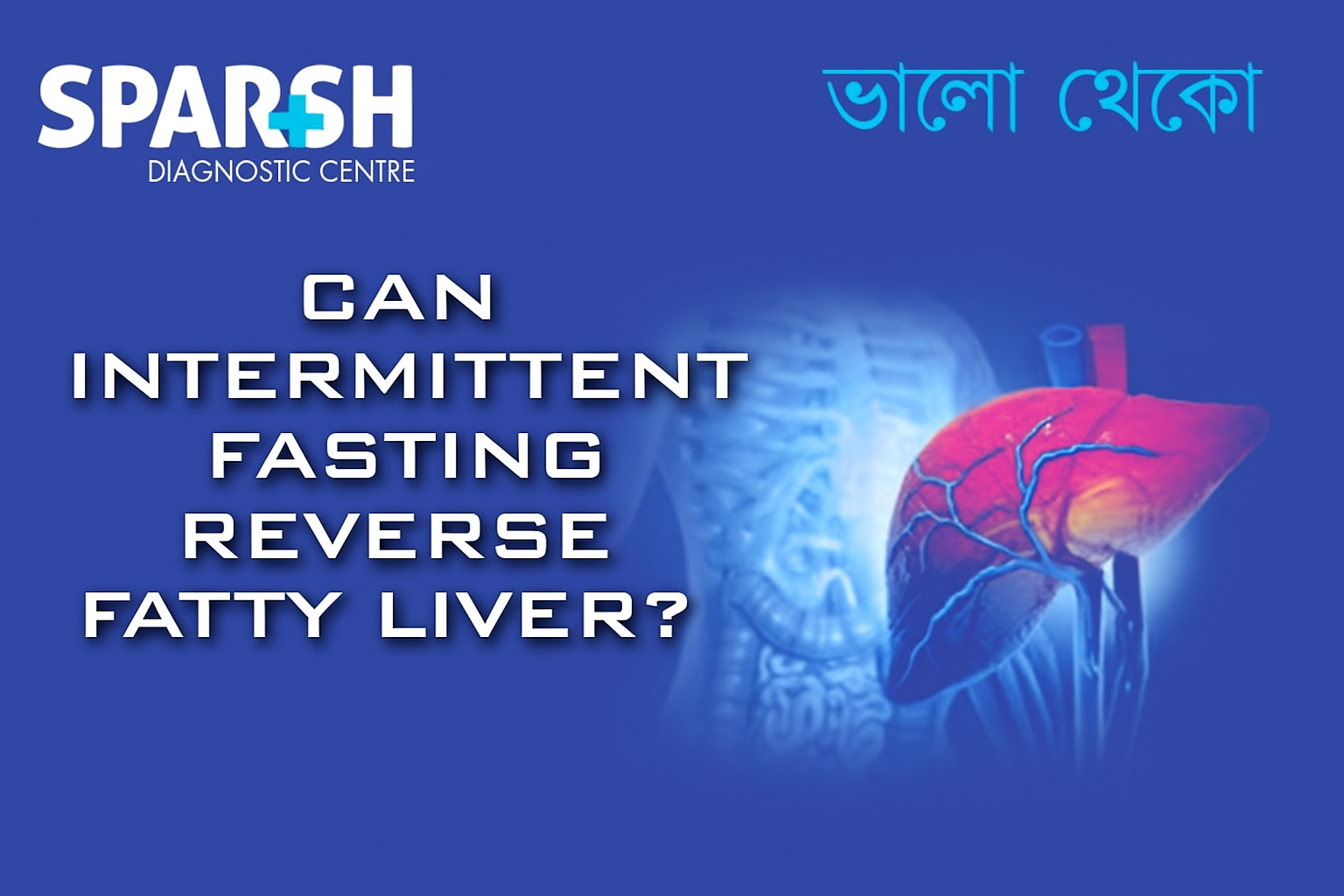Fatty liver disease, medically known as hepatic steatosis, has become one of the most common liver disorders worldwide. It occurs when excess fat builds up in the liver cells, interfering with their normal function. There are two main types: Alcoholic Fatty Liver Disease (AFLD) caused by heavy alcohol consumption and Non-Alcoholic Fatty Liver Disease (NAFLD), which is often linked to obesity, diabetes, and poor dietary habits.
According to the World Health Organization (WHO), NAFLD affects nearly 25–30% of the global population, making it a growing public health concern. The good news is that fatty liver can often be managed and even reversed through lifestyle changes, especially diet and exercise. One of the most promising strategies in recent years is intermittent fasting (IF).
This blog explores the science behind intermittent fasting and whether it can truly help reverse fatty liver disease.
Understanding Fatty Liver Disease
What is Fatty Liver?
Fatty liver disease occurs when fat makes up more than 5–10% of the liver’s weight. While mild cases may not cause symptoms, progression can lead to inflammation, fibrosis, cirrhosis, and even liver cancer.
Risk Factors for Fatty Liver
Poor diet (high sugar and refined carbs)
Excessive alcohol intake (in AFLD)
Symptoms of Fatty Liver
Most people don’t experience early symptoms. However, some may develop:
Abdominal discomfort (upper right side)
Unexplained weight gain
If untreated, fatty liver can progress to Non-Alcoholic Steatohepatitis (NASH), cirrhosis, and liver failure.
What is Intermittent Fasting?
Intermittent fasting (IF) is an eating pattern that alternates between periods of fasting and eating. Instead of focusing on what you eat, IF emphasizes when you eat.
Common Intermittent Fasting Methods
16:8 Method – Fasting for 16 hours and eating within an 8-hour window.
5:2 Diet – Eating normally for 5 days and restricting calories (500–600) on 2 days.
Alternate-Day Fasting – Fasting every other day.
Eat-Stop-Eat – 24-hour fast once or twice a week.
How does Intermittent Fasting impact the Liver
The liver plays a crucial role in metabolism, detoxification, and fat storage. When fat accumulates, liver function weakens. Intermittent fasting helps restore balance in several ways:
1. Improves Insulin Sensitivity
Insulin resistance is a major driver of NAFLD. During fasting, insulin levels drop, which allows the body to use stored fat (including liver fat) for energy. This reduces overall fat accumulation.
2. Promotes Fat Burning (Lipolysis)
Fasting activates the process of lipolysis, where stored triglycerides are broken down into fatty acids and ketones. This metabolic shift reduces liver fat.
3. Reduces Inflammation
Chronic inflammation worsens liver damage. IF has been shown to lower inflammatory markers like C-reactive protein (CRP), supporting liver healing.
4. Stimulates Autophagy
Autophagy is the body’s way of cleaning out damaged cells and regenerating healthy ones. Fasting activates autophagy, which can help remove fat-laden liver cells.
5. Aids Weight Loss
Obesity is one of the strongest risk factors for fatty liver. Intermittent fasting helps in sustainable weight loss, which directly improves liver health.
Scientific Evidence: Can IF Reverse Fatty Liver?
Several studies have investigated the effects of intermittent fasting on fatty liver disease:
2019 Study in Cell Metabolism: Found that time-restricted feeding improved insulin sensitivity and reduced liver fat in obese individuals.
2020 Research in Nutrition Reviews: Reported that intermittent fasting significantly lowered liver enzyme levels (ALT, AST), indicators of liver damage.
Animal Studies: Mice subjected to IF protocols showed reduced liver fat accumulation and improved metabolic health.
Clinical Trials: Patients with NAFLD practicing intermittent fasting for 12 weeks showed reduced fat buildup and improved liver function tests.
While more long-term human studies are needed, current evidence strongly suggests that intermittent fasting can help reverse fatty liver disease, especially when combined with a balanced diet and regular exercise.
Benefits of Intermittent Fasting for Fatty Liver
Reduces Liver Fat – By enhancing fat metabolism.
Improves Metabolic Health – Lowers blood sugar and cholesterol levels.
Supports Weight Loss – A key factor in NAFLD reversal.
Protects Against Fibrosis – By lowering inflammation and oxidative stress.
Improves Gut Health – Which indirectly benefits liver function.
Potential Risks and Considerations
While intermittent fasting can be effective, it may not be suitable for everyone.
Who Should Be Cautious?
People with diabetes on medication (risk of hypoglycemia).
Pregnant or breastfeeding women.
Individuals with eating disorders.
Patients with advanced liver disease (cirrhosis).
Possible Side Effects
Hunger and irritability (especially in the beginning).
Headaches and fatigue.
Overeating during eating windows.
It’s essential to consult a doctor or nutritionist before starting intermittent fasting, especially if you have existing health conditions.
Practical Tips for Using Intermittent Fasting for Fatty Liver
Start Slow – Begin with a 12:12 schedule before moving to 16:8.
Stay Hydrated – Drink water, green tea, or black coffee during fasting hours.
Eat Balanced Meals – Focus on whole foods: lean proteins, vegetables, whole grains, and healthy fats.
Avoid Processed Foods – Sugary snacks and refined carbs worsen fatty liver.
Combine with Exercise – Aerobic exercise and strength training enhance fat metabolism.
Be Consistent – The benefits of IF build up over weeks and months.
Diet Recommendations Alongside Intermittent Fasting
Intermittent fasting works best when paired with a liver-friendly diet:
High in Fiber: Vegetables, fruits, legumes, whole grains.
Lean Proteins: Fish, chicken, tofu, lentils.
Healthy Fats: Olive oil, nuts, seeds, avocado.
Low in Sugar: Minimize sodas, sweets, refined carbs.
Antioxidant-Rich Foods: Green leafy vegetables, berries, turmeric, and green tea.
Lifestyle Modifications to Boost Results
Regular Exercise – At least 150 minutes of moderate activity weekly.
Limit Alcohol – Or avoid completely.
Quit Smoking – Reduces liver and heart disease risk.
Manage Stress – Chronic stress worsens insulin resistance.
Get Regular Checkups – Monitor liver enzyme levels and metabolic markers.
Final Thoughts
So, can intermittent fasting reverse fatty liver?
The answer appears to be yes—intermittent fasting can significantly reduce liver fat, improve insulin sensitivity, and promote overall liver health. However, it is not a magic cure. It works best as part of a holistic lifestyle that includes a balanced diet, exercise, stress management, and medical monitoring.
If you’re struggling with fatty liver disease, consider discussing intermittent fasting with your doctor to create a safe, personalized plan. With consistency and the right approach, you can take powerful steps toward reversing fatty liver naturally.
FAQs on Intermittent Fasting and Fatty Liver
Q1. Can intermittent fasting completely cure fatty liver?
Intermittent fasting can reduce fat accumulation and improve liver function, but it is most effective when combined with lifestyle changes like healthy eating and exercise. Advanced stages may still require medical treatment.
Q2. How long does it take for intermittent fasting to improve fatty liver?
Results vary, but many studies show improvement in liver enzymes and fat reduction within 8–12 weeks of consistent intermittent fasting.
Q3. Which intermittent fasting method is best for fatty liver?
The 16:8 method is considered safe, sustainable, and effective for most people with fatty liver.
Q4. Can I drink coffee or tea during intermittent fasting?
Yes, as long as they are unsweetened and without milk or cream. Black coffee, green tea, and herbal teas are allowed.
Q5. Is intermittent fasting safe for everyone with fatty liver?
No. People with diabetes, pregnant or breastfeeding women, and those with advanced liver disease should avoid intermittent fasting unless supervised by a healthcare professional.
Q6. Can intermittent fasting prevent fatty liver in the future?
Yes. By maintaining healthy weight, improving insulin sensitivity, and reducing inflammation, IF can lower the risk of developing fatty liver.
#BhaloTheko
Disclaimer:
No content on this site, regardless of date, should ever be used as a substitute for direct medical advice from your doctor or other qualified clinician.

![]()





